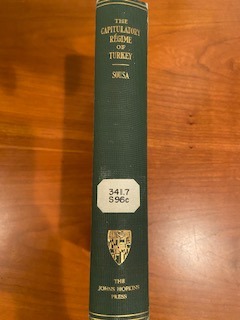Throwback Thursday: The Tate Letter and Foreign Sovereign Immunity
Seventy years ago this week, Department of State Legal Adviser Jack Tate wrote to Attorney General Philip Perlman to announce a sea change in State’s litigation practice vis-à-vis foreign sovereign immunity. The so-called “Tate Letter” informed the Department of Justice that State would shift from the “classical” approach to sovereign immunity to what’s known as…
Continue ReadingWhat the Restatement Actually Says: A Response to Brilmayer and Listwa
In a recent post, Lea Brilmayer and Dan Listwa argue that there is a contradiction in the draft Restatement (Third) of Conflict of Laws, for which I am the Reporter. They claim that the Restatement’s two-step model for choice of law is in fundamental conflict with its statement of blackletter rules, and they argue instead…
Continue ReadingA Primer on Foreign Official Immunity
Foreign official immunity refers to rules of international and domestic law that shield foreign officials from suit and from criminal prosecution. These rules are related to the rules of foreign sovereign immunity, codified in the U.S. Foreign Sovereign Immunities Act (FSIA), but they differ from those rules in many respects. Rules of foreign official immunity…
Continue ReadingDistrict Court Quashes Substituted Service on Chinese Defendant
In a recent decision, Topstone Communications, Inc. v. Chenyi Xu, a federal court in Texas (Judge Keith Ellison) held that a plaintiff headquartered in Texas must serve defendants based in China by using the Hague Service Convention. The opinion provides a good analysis of how both substituted service on a state official and service by email…
Continue ReadingCourt Holds that ATS Claims for Medical Experimentation Are Not Impermissibly Extraterritorial
In a recent decision, Estate of Alvarez v. The Johns Hopkins University, a federal district court held that claims under the Alien Tort Statute (ATS) based on nonconsensual medical experiments in Guatemala were not impermissibly extraterritorial. Although the district court ultimately granted summary judgment for the defendants on other grounds, the decision is significant because…
Continue ReadingRecent Scholarship on Political Economy and the Foreign Sovereign Immunities Act
Professor Maryam Jamshidi (@MsJamshidi) just published an article highlighting the relationship between capitalism and the law of foreign sovereign immunity, especially in the United States. The article includes a detailed and rich account of current developments under the Foreign Sovereign Immunities Act (FSIA). It comes as no surprise that the United States (and other global actors)…
Continue ReadingThrowback Thursday: The Ottoman Empire, the Capitulations, and War
Yes, the “capitulations” are often the stuff of very old books, the kind of books frequently discarded, the ones that you see heaped up sadly on the sidewalk in the rain next to libraries making space for people to surf the internet. Books, that is, like Nasim Sousa’s, The Capitulatory Regime of Turkey: Its History,…
Continue ReadingHavlish Plaintiffs File a Potentially Misleading Brief Claiming Entitlement to Afghan Central Bank Assets
The 2021 return of the Taliban to power in Afghanistan has led to litigation in the United States over the assets of the Afghan Central Bank (“DAB”). As I explained in an earlier post, an executive order by President Biden froze about $7.0 billion in DAB assets held in New York. A license from the…
Continue ReadingA Theory-Less Restatement for Conflict of Laws
For the first time in over half a century, the American Law Institute (“ALI”) is drafting a new Restatement of Conflict of Laws. The world has changed a great deal since 1971 when the Restatement (Second) was published, growing far more interconnected—so the idea of a new Restatement, taking into account the last few decades…
Continue Reading



